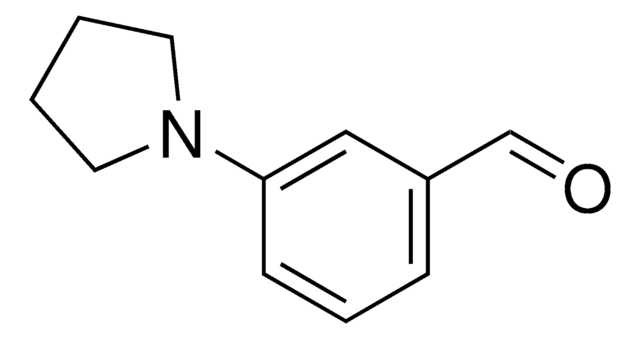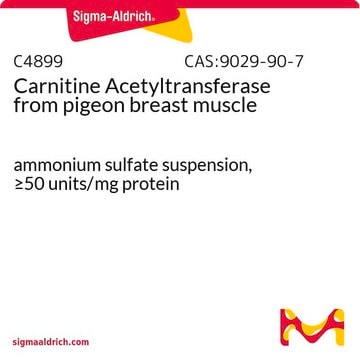推荐产品
Agency
USP/NF
reag. Ph. Eur.
质量水平
等级
puriss. p.a.
方案
≥99% (perchloric acid titration)
灼烧残渣
≤0.1% (as SO4)
缺失
≤0.5% loss on drying
mp
72-75 °C (lit.)
73-75 °C
溶解性
ethanol: 0.1 g/10 mL
痕量阳离子
Ca: ≤10 mg/kg
Cd: ≤5 mg/kg
Co: ≤5 mg/kg
Cr: ≤5 mg/kg
Cu: ≤5 mg/kg
Fe: ≤50 mg/kg
K: ≤50 mg/kg
Mg: ≤5 mg/kg
Mn: ≤5 mg/kg
Na: ≤50 mg/kg
Ni: ≤5 mg/kg
Pb: ≤5 mg/kg
Zn: ≤5 mg/kg
SMILES字符串
CN(C)c1ccc(C=O)cc1
InChI
1S/C9H11NO/c1-10(2)9-5-3-8(7-11)4-6-9/h3-7H,1-2H3
InChI key
BGNGWHSBYQYVRX-UHFFFAOYSA-N
正在寻找类似产品? 访问 产品对比指南
相关类别
一般描述
4-(Dimethylamino)benzaldehyde is also commonly referred as Ehrlich′s reagent. Its crystal structure has been investigated by X-ray analysis. Its crystals belong to the monoclinic crystal system and exhibits space group P21/n.[1] 4-(Dimethylamino)benzaldehyde exhibits dual fluorescence. Its dipole moment in various excited states has been evaluated using their electronic spectra and Bilot-Kawski theory.[2]
应用
与吡咯和伯胺反应生成有色缩合产物(席夫碱)。
4-(Dimethylamino)benzaldehyde in micelle (sodium dodecyl sulphate) containing medium may be used for the quantification of hydroxyproline in meat samples by spectrophotometric methods.[3]
警示用语:
Warning
危险声明
危险分类
Skin Sens. 1B
储存分类代码
11 - Combustible Solids
WGK
WGK 1
闪点(°F)
327.2 °F - closed cup
闪点(°C)
164 °C - closed cup
个人防护装备
Eyeshields, Gloves, type N95 (US)
其他客户在看
Kawski A, et al.
Chemical Physics Letters, 448(4), 208-212 (2007)
4-(Dimethylamino) benzaldehyde.
Gao B and Zhu J-L.
Acta Crystallographica Section E, Structure Reports Online, 64(7), 1182-1182 (2008)
Determination of pyrrole derivatives and hydroxyproline with 4-(dimethylamino) benzaldehyde in a micellar medium.
Esteve-Romero JS, et al.
Analytical Letters, 27(8), 1557-1567 (1994)
Jun-Min Guo et al.
Journal of agricultural and food chemistry, 58(11), 6556-6561 (2010-05-15)
A simple colorimetric method for the differentiation of indoleacetic acid (IAA) and indolebutyric acid (IBA) in plant samples is described. The color change is based upon the reaction between the auxins and p-(dimethylamino)benzaldehyde (PDAB, Ehrlich reagent) following the electrophilic substitution
Rosario Zamora et al.
Journal of agricultural and food chemistry, 52(13), 4166-4171 (2004-06-24)
The Ehrlich reaction was optimized to determine the formation of pyrrolized phospholipids in edible oils in an attempt to understand the color reversion produced during the deodorization of poorly degummed edible oils. The procedure consisted of the treatment of the
Active Filters
我们的科学家团队拥有各种研究领域经验,包括生命科学、材料科学、化学合成、色谱、分析及许多其他领域.
联系技术服务部门











